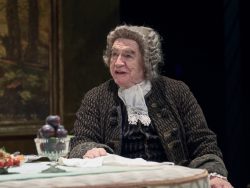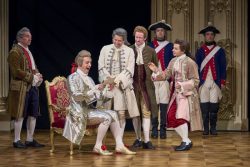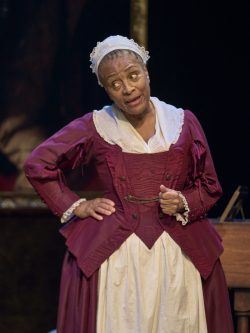
 JUST what is actor-writer Oliver Cotton’s new play The Score about? At its centre is Johann Sebastian Bach, mesmerisingly played by big and small screen actor Brian Cox (Logan Roy in Succession), whose presence is packing Bath Theatre Royal until 28th October. Cox has not been seen on stage for 17 years, and The Score makes way for his James Tyrone in Long Day’s Journey Into Night in the West End next year. He has lost none of his subtle power and his 62-year old Bach magnetises the stage.
JUST what is actor-writer Oliver Cotton’s new play The Score about? At its centre is Johann Sebastian Bach, mesmerisingly played by big and small screen actor Brian Cox (Logan Roy in Succession), whose presence is packing Bath Theatre Royal until 28th October. Cox has not been seen on stage for 17 years, and The Score makes way for his James Tyrone in Long Day’s Journey Into Night in the West End next year. He has lost none of his subtle power and his 62-year old Bach magnetises the stage.
But is the play about Bach, and is “The Score” the scrap of paper produced by King Frederick (the Great) of Prussia when JS comes to his palace in Potsdam to see his son CPE (Carl) Bach, who is working for the king? Bach Snr is famous for his fugues, but Frederick (Stephen Hagan), then 35 years old and relishing his triumph in war over Silesia, is an amateur flautist who wants to defeat the great composer with his “unfugueable” theme. He gets his three court composers to make sure the theme is sufficiently complex to flummox the old fox.
 Of course, Carl Bach (Matthew Burns) knows that his father can write a fugue as easily as most of us could pick up a pen and paper. Bets are placed and the inevitable outcome brings a win of what today would be about £270,000 for the younger Bach.
Of course, Carl Bach (Matthew Burns) knows that his father can write a fugue as easily as most of us could pick up a pen and paper. Bets are placed and the inevitable outcome brings a win of what today would be about £270,000 for the younger Bach.
The back story (remembering that the detail of this meeting has been imagined by the playwright) is of JS Bach, a deeply religious man who abhors war and its trappings and believes that music is the way to find God and the channel through which God can speak, meeting a powerful monarch whose own brutal history has fuelled his increasingly bellicose actions. Has the king tried to set a trap for the father-figure Bach, or is he attempting to find his own humanity after the abuse heaped on him by his own cruel father?
 Trevor Nunn directs with Robert Jones’s clever designs, changing the rooms with massive old masters dropped into the action.
Trevor Nunn directs with Robert Jones’s clever designs, changing the rooms with massive old masters dropped into the action.  It all looks wonderful, and if the precise direction of the music played on various keyboards is a bit suspect, it hardly matters.
It all looks wonderful, and if the precise direction of the music played on various keyboards is a bit suspect, it hardly matters.
Undoubtedly, the first half of Oliver Cotton’s play is verbose, and his Ping, Pang and Pong trio of conspiring composers are unnecessarily repetitive. But by the second half, when JS Bach swallows up the challenge, leaves the royal palace at Potsdam for his Leipzig home and then thinks about what the king might actually have needed, the drama is compelling.
GP-W
Photographs by Manuel Harlan